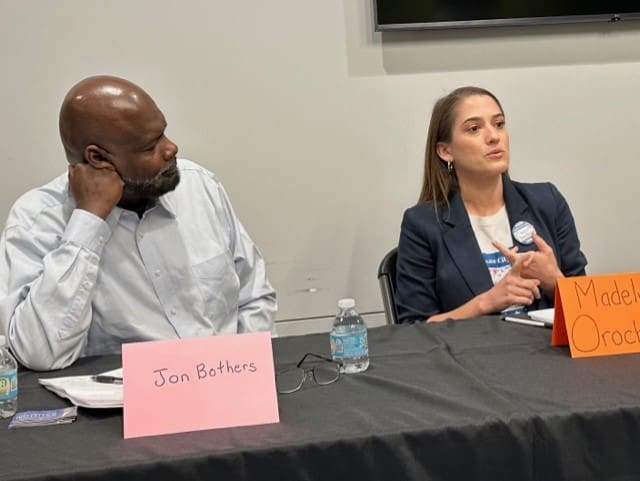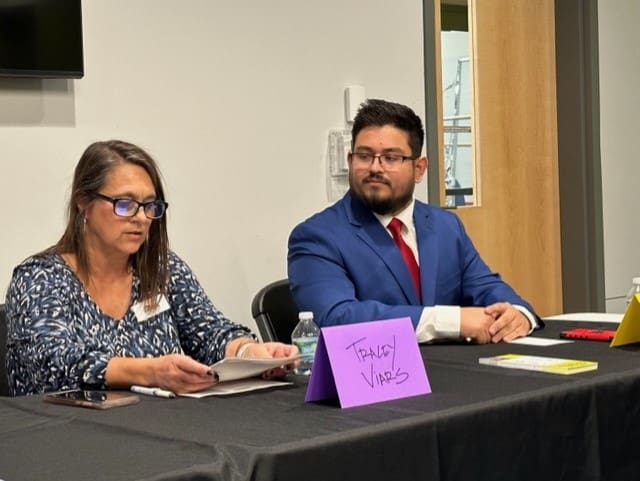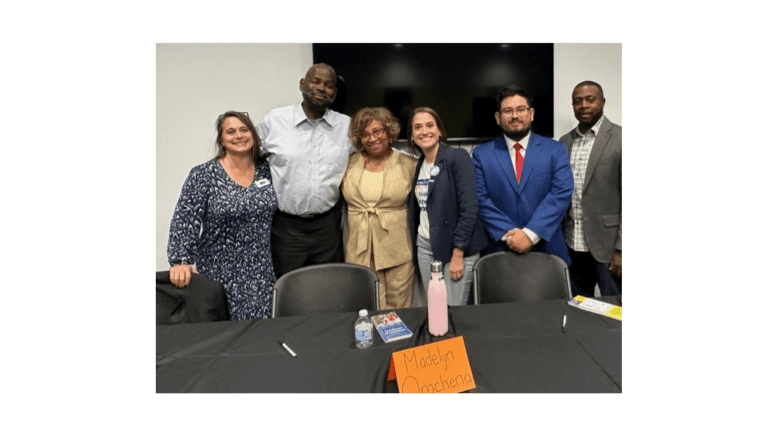L-R Tracey Viars, Jon Bothers, Monica Wills Brown of the Cobb County Democracy Center, Madelyn Orochena, Anthony Gutierrez, and moderator Rod Green (Photo by Rebecca Gaunt)
By Rebecca Gaunt
“If you received a $1 million grant to use for the city any way you wanted, what would you do and why?” was one of the questions posed to the four participating candidates for Kennesaw City Council at Tuesday’s forum, put on by the Center for Common Ground and the Cobb County Democracy Center.
In attendance, Madelyn Orochena and Jon Bothers, who are challenging incumbent Lynette Burnette for the Post 1 seat. Burnette did not attend.

Also present, Post 2 candidates Anthony Gutierrez and incumbent Tracey Viars.

Gutierrez said he would put the hypothetical grant toward energy independence, in the form of tax credits for solar panels.
“Georgia Power is a monopoly. They have every say and we can’t do anything about it. We pay all their bills. They reap all of the benefits. And at the end of the month our reward is a higher bill,” he said.
Bothers followed with support for solar panels, more parks, and working with Habitat for Humanity to provide affordable housing.
“Investing in more sustainable infrastructure, I think, is the clear future way to go,” Orochena said.
However, the former member of the Kennesaw Arts and Culture Commission said she would put some toward the arts.
“A natural, aesthetic playground. It’s beautiful to look at,” she said, using the new downtown Woodstock playground as an example that incorporated natural features and landscapes into the design. Kennesaw’s downtown playground was displaced by the Depot Park amphitheater currently under construction.
Viars’ answer was also a combination of aesthetics and practicality: improving pedestrian safety with planters, art, and tree lined medians, in addition to the light up crosswalks she has advocated for in the past.
“I think that it helps the businesses downtown when people feel safe and secure,” she said.
Kennesaw’s rapid growth, rising housing costs, and infrastructure were the crux of the discussion.
Gutierrez described himself as a pioneer standing up against the “luxury apartments and gentrification that’s destroying our affordability and our city.”
The building is outpacing improvements to the roads, is how Bothers sees the situation.
“We have about 2,000 apartments being built right now in the city that has been approved or will be approved in the city very very soon. That’s going to bring more traffic,” Bothers said.
He called for a range of housing options, rather than focusing on luxury apartments. Bothers also took issue with a developer who presented to the Council describing how he would ensure his apartments were out of the financial reach of students, which also eliminates lower-income families’ access as well.
“We’re saying yes to everything,” Bothers said. “There’s only one or two [council members] that ever ask questions.”
Orochena said her family’s decision to purchase a home on Main Street was to take advantage of the walkability in Kennesaw.
“We do need some level of density to support the local businesses if you want to have a little small-town center,” she said. “It does serve a purpose, and now that we have a lot of that density, we can maybe try to focus a little bit more on businesses, retail, entertainment, and variety of services downtown.”
Gutierrez questioned the description of Kennesaw as “thriving.” If elected, he said he’d push back against luxury corporate complexes.
“Our city council likes to say they have foresight,” he said. “They always complain that there’s a lot of traffic and dangerous driving on Cherokee Street. So what do they do? They add an 800-apartment unit complex on McCollum and Cherokee Street.”
At the heart of Gutierrez’s frustration: he believes there is too much focus on bringing new people to Kennesaw, and not enough focus on the people who are already there.
Viars drew from her experience as a council member and working in commercial real estate to counter some of the comments.
“Most of our luxury apartments are at 97% full. You can’t even get in if you want. KSU helps with that, much to some people’s chagrin. It’s not the popular answer but we do need more student housing,” Viars said.
Kennesaw has had challenges with multiple unrelated students renting homes in residential neighborhoods, in violation of county and city ordinances. Additionally, Viars listed SPLOST-funded projects on the horizon that will hopefully lift some of the burden on city streets.
Kennesaw also faces challenges that differ from the neighboring cities of Acworth and Woodstock.
“Our legacy, our literal history, we were a stop on the train line. We’re a shanty town,” she said.
Kennesaw lacks the early 1900s retail infrastructure of other cities, which creates a barrier to starting businesses, Viars explained. Tearing something down and building something new requires navigating ordinances related to historic preservation. Nor does Kennesaw have a Main Street as long as those cities. Viars said that’s why she has focused on helping new businesses, such as Lazy Guy Distillery, Horned Owl Brewing and Vesuvio Pizza, to locate downtown.
She also asserted that, statistically, the city has more single-family homes than apartments.
“When you’re looking at property that’s $1.5 million per acre, I can tell you, I intimately know, building vertically is all you can do,” Viars said.
For more on the candidates, read the Courier’s September Q&A with Post 1 candidates here and Post 2 candidates here.
Mayor Derek Easterling is unopposed for reelection.
The nonpartisan City Council holds staggered elections. The terms for Posts 3, 4, and 5 will be up in 2025. All posts serve at-large.
Early voting begins Oct. 16. Election Day is Nov. 7.
